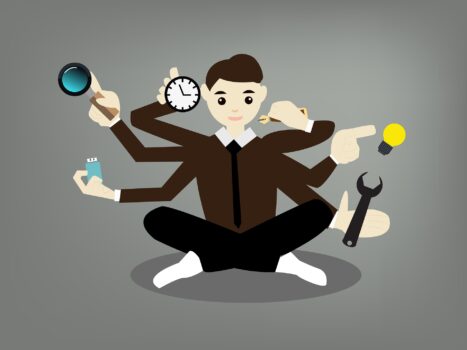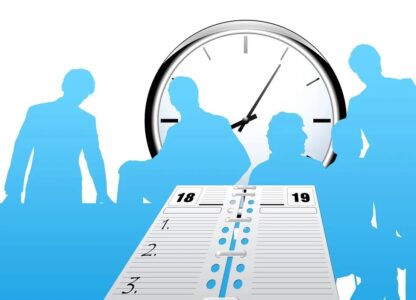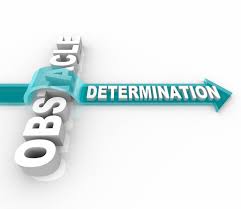Personal Effectiveness : “Boosting Your Productivity for Lasting Results“
Personal effectiveness is the ability to use your time and resources to the fullest in order to achieve your goals. It is a key factor in determining one’s success in life and ability to manage time, resources, and tasks in order to achieve desired goals. It is important to develop effective personal habits in order to become more successful in life. There are a number of factors that can affect one’s personal effectiveness.
Here are some tips on how to become more effective in your personal life:
The first step to becoming an effective person is to Have a Clear Vision and Goal. It is essential to have a purpose in life and to have a plan for achieving it. Take some time to think about what you want to achieve in life and plan the steps you need to take to get there. There are many ways to have a clear vision and goal to become an effective person. Some of them are as follows:
- Identify your values: Take time to identify your core values and use them as a guide to set your vision and goals
- Set realistic goals: Set realistic goals that are achievable, measurable, and within a given timeframe. Setting realistic and attainable goals is essential for personal 6. Manage stress: Use mindfulness techniques, such as meditation or yoga, to manage stress.
- Reflect: Use the end of each day to reflect on your progress and adjust your plan or effectiveness. It is important to set both long-term and short-term goals in order to stay motivated and on track with one’s objectives.
- Make a plan: Make a detailed plan of action that outlines the steps you need to take to achieve your goals
- Break it down: Break down big goals into smaller, manageable tasks that you can work on one at a time.
- Developing good communication skills: It will help you get your point across and be able to collaborate with others.
Second, it is important to Be Organised: Create a system to manage your time and resources and use these tips to stay organized.
- Develop a plan: Set realistic goals. When setting goals, make sure they are achievable and specific. This will help you stay on track and make progress toward your goals, prioritize tasks, and create a plan for how to accomplish them.
- Time management: Time management is key to getting the most out of your day. Learn how to plan your day, set time limits for tasks, and delegate tasks if necessary. Schedule time for tasks, and stick to the plan.
- Eliminate distractions: Turn off notifications, limit social media use, and create a distraction-free environment.
- Delegate: Outsource tasks that are not your strengths or that can be completed more efficiently by someone else.
- Take breaks: Take regular breaks throughout the day to stay focused and productive. It can also help you avoid burnout.
- Set boundaries: Let people know when you’re available and when you’re not.
7. Having a planner or to-do list can help you keep track of tasks and prioritize them according to importance.
Third, it is important to Set Priorities. It is easy to get overwhelmed by the number of tasks you have to do in a day. To be successful, you must prioritize your tasks according to importance and urgency.
- Practice self-care. Make sure you take care of yourself by getting enough rest, eating a balanced diet, and exercising regularly. Self-care is essential for personal effectiveness.
- Organization: Being organized is a key factor in personal effectiveness. It involves setting up systems and processes to ensure that tasks are completed on time and efficiently.
- Self-Discipline: Self-discipline is also important for personal effectiveness. It involves having the ability to stay focused
- Stay motivated: Reward yourself for completing tasks and set realistic goals.
- Streamline processes: Use technology to automate tasks or simplify processes.
By following these tips, you can become more effective in your personal life. Take the time to develop good habits and focus on what you need to do in order to reach your goals. With a little bit of effort, you can become more successful in life.
Our Personal Effectiveness is influenced by various factors. These are:
Time Management
Effective time management is essential for personal effectiveness. It involves setting priorities, planning ahead, and setting realistic goals. It is important to manage one’s time properly in order to make the most of available resources. When we manage our time well, we can use our time more effectively. We can accomplish our goals faster and with greater success. We can allocate time to the most important tasks and make sure that we have enough time to complete them.
In addition, we can develop better habits, such as taking regular breaks, that can help us stay focused and productive. Having an effective time management system also helps us to stay motivated and organized. We can set deadlines for ourselves and plan ahead. We can also break down large tasks into smaller, more manageable chunks. This helps us to stay on track and not get overwhelmed by large projects.
Time management also helps us stay on top of our lives. We can keep track of our commitments and make sure that we are able to meet them. We can also find time for ourselves and take breaks so that we can recharge and remain productive. Time management is an important factor when it comes to personal effectiveness. It helps us to stay organized, reduce stress, and create balance in our lives. It also helps us to be more productive and efficient. By managing our time well, we can make sure that we have enough time to complete our tasks and achieve our goals.
Focus and Concentration
Being able to focus and concentrate on tasks is also important for personal effectiveness. It is important to be able to focus on the task at hand and limit distractions in order to be able to effectively manage time and resources. Focus is a crucial factor in determining one’s personal effectiveness. It can be defined as the ability to concentrate on a task and maintain focus for a sustained period of time. When we focus, we are able to think more clearly, and our actions become more precise and efficient.
In other words, focus helps us to get more done in less time, and with better results. Having a focused mindset can also help us to stay organized, prioritize tasks, and maintain a productive routine. It allows us to stay motivated and reach our goals in a timely manner. When we focus on something, we are able to dedicate our full attention to it and not be distracted by other tasks or thoughts. This enables us to reach our goals faster and with greater accuracy.
Focus also helps us to stay in control of our emotions. When we are able to stay focused, it reinforces our sense of self-confidence and self-discipline. This allows us to remain calm and collected in high-pressure situations. This can be especially beneficial when dealing with difficult people or when facing challenging tasks. Finally, focus can help us to increase our productivity. By being able to stay focused on our tasks, we are able to work faster and more efficiently. This enables us to complete our tasks in a timely manner, and with better quality.
In conclusion, the focus has a major influence on our personal effectiveness. It can help us to stay organized, prioritize tasks, and stay in control of our emotions. Focus also enables us to increase our productivity, as we are able to work faster and more accurately. All of these factors ultimately help us to reach our goals in a timely manner and with better results.
Determination
Determination is a trait that can have a huge impact on personal effectiveness. It is the driving force behind achieving any goal and is essential for success. Determination is the commitment to persist in accomplishing something, despite any obstacles or difficulties.
People who demonstrate determination are able to persevere, even when faced with failure or disappointment. The power of determination can be seen in the stories of successful people. They have the persistence and drive to keep going no matter what. They are willing to work hard, take risks, and make sacrifices in order to reach their goals.
Without determination, it would be impossible to achieve anything of significance. Determination is also important for personal growth and development. People who are determined to improve themselves and reach their goals will find that they have more energy and enthusiasm for life. They will also be more likely to take action, take risks, and make the necessary changes in order to reach their goals. Determination also helps us stay focused on our goals. It gives us the motivation to continue even when things seem impossible. It helps us stay disciplined and stay on track when our motivation is flagging. Determination can be the difference between achieving a goal and giving up.
Finally, determination also helps us manage stress and remain calm in difficult situations. When we are determined to reach our goals, we can draw on our inner strength to stay focused and remain positive, even when things are not going our way. This can be incredibly empowering and can help us manage challenges and stay on track.
In conclusion, a determination is an essential trait for personal effectiveness. It gives us the strength and focuses to achieve our goals and to keep going no matter what. People who demonstrate determination are more likely to succeed, and it can be the difference between success and failure.
Self Confidence
Self-confidence is an essential trait that allows us to take risks, work hard and ultimately reach our goals. It is the foundation for personal effectiveness and can be a major factor in determining how successful we will be in life.
Self-confidence gives us the courage to take risks, try new things, and challenge ourselves. When we believe in ourselves and our abilities, we are more likely to push forward and strive for our goals. This helps us to stay motivated even when the going gets tough. When we have a strong sense of self-confidence, we are less likely to give up and more likely to put in the hard work needed to achieve our goals.
Self-confidence also helps us to stay focused on our goals. When we have faith in ourselves, we can stay on track and maintain our focus. This helps us to remain productive and increase our chances of achieving our goals. Self-confidence also helps us to build better relationships, both professionally and personally. When we have a strong sense of self-confidence, we are more likely to communicate effectively and build strong relationships. This can help us to create and maintain successful relationships with our colleagues, friends, family, and clients.
Finally, self-confidence helps us to stay resilient during difficult times. When we have confidence in ourselves, we are better able to handle challenges and setbacks. This helps us to stay motivated and continue striving towards our goals, even when things don’t go our way.
Overall, self-confidence is an essential trait that helps us to reach our goals and be more effective in our lives. It gives us the courage to take risks, stay focused, build relationships, and stay resilient in the face of adversity. With a strong sense of self-confidence, we can achieve our goals and ultimately reach our full potential.
Problem-Solving Skills
Problem-solving is an important life skill that affects personal effectiveness on a daily basis. It involves the ability to identify and analyze problems, develop and evaluate potential solutions, and implement the most effective solution. Problem-solving skills are essential for a wide range of situations, from personal relationships to work and career success.
Effective problem-solving starts with the ability to identify a problem in the first place. This requires critical thinking and the ability to take an objective look at a situation. Once the problem is identified, it’s important to analyze the problem, including its causes and potential solutions.
This requires the ability to look at a problem from multiple angles and to think outside of the box. Once a problem is identified and analyzed, the next step is to develop and evaluate potential solutions. This involves considering the impact of each solution and determining which is the most effective and efficient. It also requires the ability to think creatively and come up with innovative solutions.
Once a solution is identified, it’s important to implement it. This requires the ability to take action, make decisions, and take responsibility for the results. It also requires the ability to make adjustments and adapt to changing circumstances.
Problem-solving skills are essential for personal effectiveness in many areas of life. They help us to identify and address problems quickly and effectively, enabling us to achieve our goals and live our best lives.
Physical Environment
The physical environment in which we live, work, and play has a significant impact on our personal effectiveness. From the climate and weather patterns that determine how comfortable we feel to the noise and other external factors that can impact our concentration and attention, our physical environment can have a profound effect on our ability to get things done.
For example, a cluttered workspace or a noisy office can make it difficult to focus and stay on task, making it harder to be productive. Similarly, a poorly lit or poorly ventilated workspace can cause fatigue or distraction, leading to a decrease in productivity.
The physical environment can also have a direct effect on our physical health. Extended exposure to indoor pollutants or sitting in one place for too long can cause fatigue, headaches, and other health problems that can detract from our personal effectiveness.
Finally, our physical environment can also impact our emotional state, which in turn can affect our productivity. For example, being in a positive and supportive environment can help us to feel more motivated and energized, while being in a negative or hostile environment can lead to anxiety and stress that can sap our productivity.
Overall, it’s important to be mindful of the physical environment in which we work and live and to make sure that it is conducive to our personal effectiveness. By taking steps to create a comfortable and supportive physical environment, we can help ensure that we are able to achieve our goals and maximize our productivity.
Conclusion
In conclusion, personal effectiveness is a key factor in achieving success in life. It requires hard work, dedication, and commitment to reach your goals. It is important to take the time to assess where you are in terms of personal effectiveness and develop a plan to improve it. By focusing on self-awareness, goal setting, time management, and self-care, you can increase your effectiveness and become the best version of yourself. Additionally, developing strong interpersonal skills, goal setting, and maintaining a positive attitude can further enhance personal effectiveness.









Thank you for the valuable step by step guidelines and realistically approachable methods.
WELCOME